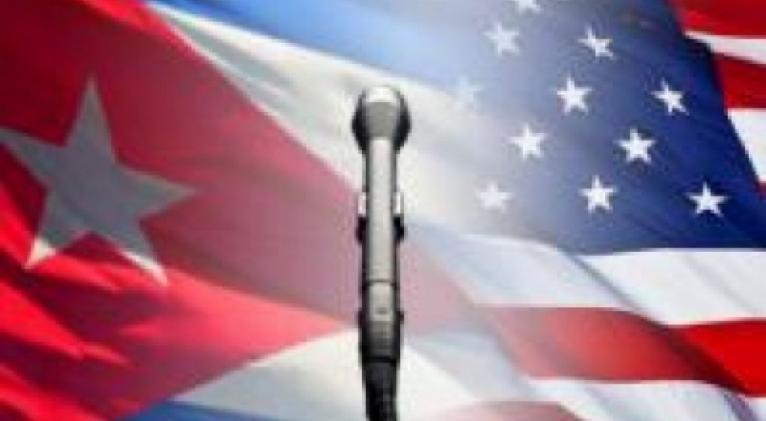Cuba and United States: intelligence and prudence
especiales

Thus happened with the meeting between Presidents Barack Obama and Raul Castro in Panama, a few months after announcing the interest of both countries to restore diplomatic relations, broken more than half a century ago in the peak of the Cold War.
Nobody thought that the agreement would be easy, but December’s gesture put into motion new forces in favor of their rapport, knowing that the road is long and there are a few who oppose a mutually satisfactory solution. Among those surprised by the event are many who never believed that the dialogue was the way to leave the path of the ongoing confrontation between two countries with a very unequal presence in the continent. Lining there appear the skeptics who had repeatedly asked Cuba’s surrender to the ideals of the empire, accepting the dogmas of a society without history as principles, the applicators of the last democratic recipes encouraged from Washington as universal formulas, but also the usual provokers, murderers, mercenaries brought to Panama to remind us where terrorism comes from, the same people who claim Obama’s head so that U.S. changes nothing. Too late, Raul Castro and Barack Obama gave proof of their sensitivity to understand that the current world requires other strategies as challenges and threats are very different from the past.
It was necessary to leave the summit’s assembly hall to verify how much the reality of the continent had changed since the last meeting. For the first time ever, the criticism from the plurality of stances set the tone of presidential speeches. Nobody was forced to shut up. Despite ongoing disputes, speech dominates the big stick Pan Americanism, something that worries the Republican Party in U.S., as well as the approach to Iran, girder of the remodeling of US foreign policy.
It is no wonder, then, that prudence, the virtue of political intelligence dominates the public expressions of Presidents Obama and Raul. Grievances are not forgotten. “We are willing to talk about everything, but we need to be patient, very patient –said Castro–. We might disagree on something today on which we could agree tomorrow”. However, none of the two, neither Raul nor Obama, stop marking the scopes of the meeting. “The Cold War has been over a long time ago and U.S. looks to the future”, said Obama, according to press reports.
They know better than anyone else how many attempts at “normalization” remained on the road after clashing against the inflexibility of the State Department, unable to consider the siege of Cuba as a serious historical mistake due to its own imperial view. The Cuban president was right when he did not associate his US counterpart with that tradition, which is in the basis of the need to rectify. I referred to it in a text included in my book “The Lef That I Lived” (La Izquierda que viví), where I review the nature of the big US mistake on Cuba, where I say, and quote to avoid repeating myself, that US rulers, their elites “saw in Fidel’s political revolution what the media representation, created by themselves to defend their interests and the turnover of leaders, offered them, without realizing this was something different; and erred, since they did not consider that the victory against the dictatorship was the beginning of a national revolution long overdue because of the North American intervention, whose thorough fulfillment depends on the implementation of a program of social reforms able to transform power relations in Cuban society. Being unable to have understood it like that, with sufficient objectivity, by shamelessly exaggerating threats in their backyard, turns out to be perhaps the first and biggest mistake made by the United States, as well as the great failure of its foreign policy, but at the same time the most persistent and painful burden for the Cuban people. That blindness –dogmatic and immovable– explains the persistence of the blockade on the island, the durability of a situation that, in the absence of other consequences, hurts the untouchable pride of the surviving power. This “mistake”, if we can call it like that, turns out to be much more terrible after the collapse of the Soviet Union and the extinction of the ‘socialist bloc’, because the permanence of the Revolution, despite all its current problems, proves that it was not a Soviet piece in the chess of the superpowers, as the empire’s strategists and certain critics, maybe confused by their own dogmatic recipes, always believed. Instead, U.S. has recycled its fears, its aversion against every change that is not merely formal and includes Cuba in its terrorism blacklist”.
There are critics of that approach who resign themselves to saying that nothing has been gained yet, without acknowledging the great achievement of the twentieth-century Cuba, specifically: to first build –and keep in Cuba a national state worthy of that name under the hardest pressures of an infinitely stronger enemy. It is not a fable to say that words sovereignty and independence ceased to be part of the previous Republican rhetoric to become, just in 1959, something tangible for a people who had recovered the deep sense of dignity. Not long ago I wrote “And that is not anything”. Now, I ratify it.
Cubasí Translation Staff













Add new comment